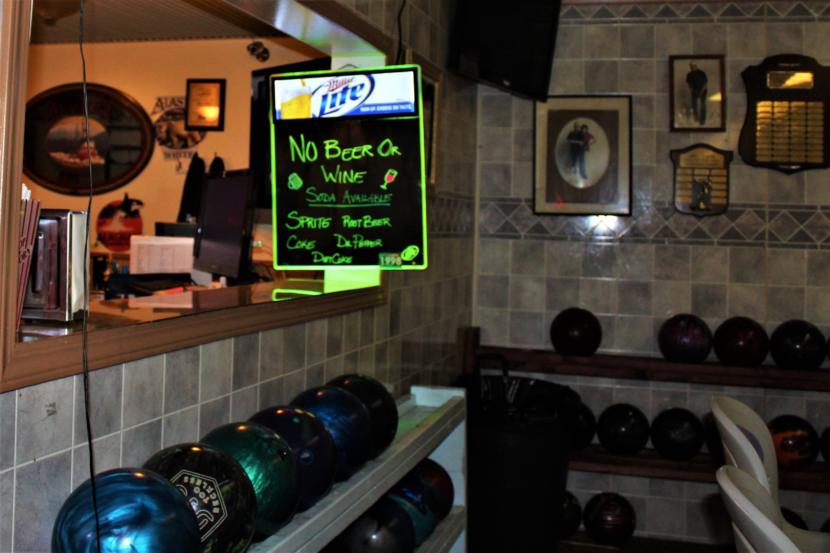
Lately, businesses in Juneau and across Alaska have been surprised to find their alcohol license renewals denied by the state.
The state alcohol board says it’s trying to follow existing statute for recreational site licenses, which only lists a few types of venues permitted to serve alcohol.
A bill working its way through the Legislature hopes to solve the issue, but legislators say more reforms are necessary to overhaul Alaska’s outdated alcohol laws.
Thursdays are typically a busy night at Taku Lanes in Juneau, but a sign by the bar warned patrons this week that no alcohol was available for purchase.
“A lot of people have been disappointed,” said manager Kenny Paquin. “Even the legislative league that bowls here, they’re actually going to bowl here later tonight around 7. It’s actually going to be a lot smaller than it used to be.”
Paquin found out about two weeks ago they would have to stop selling beer and wine immediately after the Alcoholic Beverage Control Board denied their license renewal.
They had been selling alcohol without problems for 13 years.
Without knowing it, Juneau’s only bowling alley had found itself in the middle of a messy debate over where state law permits the sale of alcohol.
“It just sucks,” Paquin said. “I mean, we’ve been losing a lot of customers.”
As it turns out, a lot of venues — like bowling alleys and ski areas — are not listed specifically in alcohol license statute.
A few years back, the control board was audited and scolded by the Legislature for being too liberal in handing out recreational site licenses.
The board responded by getting stricter. Businesses like Taku Lanes and Eaglecrest Ski Area took a hit. Eaglecrest expected to serve alcohol for the first time this season, but the board denied their first-time application. Two local tour companies — Alaska Travel Adventures and Alaska Zipline Adventures — are also at risk, according to board documents.
It came to a head in December, when the board said it might deny a license for the Alaska State Fair. They eventually voted to extend the license, but the threat prompted Sen. Peter Micciche, R-Soldotna, to propose a Band-Aid solution.
He introduced Senate Bill 16, which would expand the definition of recreational sites to include ski areas, performing arts venues and some other types of businesses that used to fit under the category.
“So what the bill is focused on is people that have traditionally operated — quality operators — licensed under the law that are currently at risk,” Micciche explained in an interview this week.
Even though bowling alleys aren’t addressed in SB 16 right now, Micciche said he’s open to including Taku Lanes and other affected businesses who contact him.
But he also said they’re not trying to create an open-door policy anyone can take advantage of.
“We are not creating a church license so that after services folks can have a few beers, right? What we’re trying to do is help those existing businesses to be clarified under statute,” Micciche said.
According to him, the section of state law that governs alcohol manufacturing and sales known as Title 4 is an outdated hodgepodge of statutes and regulations.
Micciche plans to address those issues in a bigger bill, Senate Bill 52, introduced last month.
In the meantime, he is optimistic that they can at least resolve recreational site licenses quickly with SB 16, which had a hearing in the Senate Finance Committee on Friday.
“I see no opposition to this legislation,” Micciche said. “I think it’s likely that we move through this in a schedule that avoids that interruption to business.”
Back at the bowling alley, Paquin said they’re running a special promotion for the foreseeable future to try to drum up more business.
“Dollar bowling, so it’ll be like a $5 cover charge, $1 for shoes and $1 per game, all day, every day,” he said.
They hope it helps. Otherwise, owner Cindy Price said in an email she’ll have to lay off employees.




